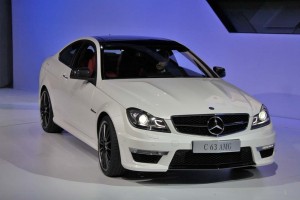
Mercedes-Benz leads the industry when it comes to treating customers in the showroom, says a new study.
Mercedes-Benz is doing the best job treating potential buyers when they walk into the showroom, reports a new study, which is one reason the maker has continued building demand as the luxury market recovers.
But while it’s the third year in a row that the German marque led the annual Pied Piper Prospect Satisfaction Index, its score actually slipped from last year, and the industry, on the whole, has seen a declining in the handling of “ups,” or customers who come to the showroom, cautions analyst Fran O’Hagan.
“Industry-wide, treatment of car shoppers has declined almost across the board,” said O’Hagan, adding that “the easiest explanation is that the number of salespeople declined during the recession and has yet to bounce back, even though sales are picking up again.”
The Pied Piper Study relies on 3,524 “mystery shoppers,” anonymous researchers who visit tens of thousands of U.S. showrooms to see how they are treated. They attempt to engage salespeople to see how they pitch products, explain their advantages and whether there’s an effort to close a deal.
Mercedes used to be back of the luxury pack in the study, notes O’Hagan, but since 2007 has adopted a series of uniform policies to ensure consistent, shopper-friendly procedures that have paid off with satisfied customers – and also made the brand “very profitable,” emphasized O’Hagan.
Using the Pied Piper metrics, Mercedes got a score of 108 – the higher the number the better.
Jaguar and Lexus were close behind, with Acura and Infiniti rounding out the Top Five. Top-rated domestic luxury brand Cadillac came in sixth. While no other domestic brand landed in the Top 10, Buick and Chevrolet both were above industry average.
At the other extreme, Mitsubishi had the lowest score, at 91, with Suzuki, Smart and Toyota’s Scion doing only slightly better.
The numbers offer more than just bragging rights. The top 10 brands on the PSI study sell an average of 42 cars a month, notes O’Hagan, while those in the bottom 10 deliver just 12. The typical Mercedes dealer is averaging 55 sales a month, while Lincoln is generating just five.
But there are some exceptions. Another recent study, by TrueCar.com, found that Scion is the brand young Gen-Y buyers crave most. (Click Here for that story.) So product and brand image can sometimes overcome poor dealer performance. But it may also suggest that young shoppers simply aren’t aware of how they could and should be treated in the showroom.
They also may not give off the signals that salespeople look for when trying to rate an “up,” as a new shopper is known in the industry.
“Sales people instinctively try to size a shopper up to decide who really will buy, and if they don’t think they are actually serious, the salesperson will try to get rid of them as soon as possible,” noted O’Hagan. But a smart dealer knows, “You want a shopper to leave as a fan of your dealership so they’ll come back, maybe only three years later, or will tell their friends about your store.”
The best salespeople, he concludes, know and carefully explain their products, follow consistent procedures and, in the end, make sure to ask for the sale. A surprising amount of business is lost, O’Hagan says with amazement, simply because salespeople don’t ask a prospect whether they are ready to close the deal.
